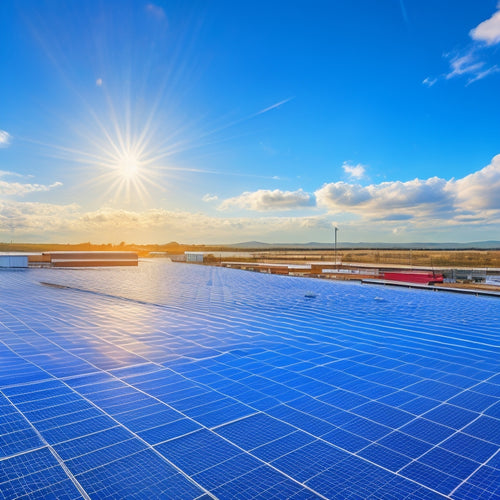
Solar Battery Storage System
Share
You can utilize the power of solar energy with a solar battery storage system, which allows you to store up to 4.7 kilowatt-hours of energy per hour, reducing your reliance on fossil fuels and taking a significant step towards a sustainable future. By integrating solar energy into your daily life, you'll not only reduce your carbon footprint but also enjoy significant financial savings through reduced energy bills. With advanced deep cycle battery technology, you'll experience longer cycle life, increased energy storage capacity, and optimized energy distribution. As you investigate the world of solar battery storage, you'll uncover even more benefits and opportunities to maximize your energy independence.
The Essentials
- Solar battery storage systems reduce reliance on fossil fuels, leading to a significant decrease in carbon footprint and contributing to a sustainable future.
- Deep cycle battery technology is crucial for solar battery storage systems, with factors like battery efficiency, energy density, and discharge rates influencing energy storage capacity.
- Power matching is essential to ensure the wattage of the solar battery storage system aligns with load requirements, enhancing system performance and energy distribution.
- Solar battery storage systems provide energy independence and security, offering control over energy supply, financial savings, and potential income from excess energy.
- Renewable energy integration increases reliance on renewable energy supply, reducing grid dependence and leading to significant environmental benefits and cost savings.
Reduced Carbon Footprint Guarantee
You're looking for a solar battery storage system that aligns with your commitment to eco-friendly energy solutions.
By integrating this technology into your daily life, you'll be reducing your reliance on fossil fuels and lowering emissions today.
With renewable energy storage, you can store excess energy generated by your solar panels during the day to use at night or during power outages, further minimizing your carbon footprint.
As a result, you'll be taking a significant step towards minimizing your carbon footprint and contributing to a more sustainable future.
Eco-Friendly Energy Solutions
As the world grapples with the challenges of climate change, shifting to eco-friendly energy solutions has become a necessity. You're likely aware of the importance of reducing your carbon footprint, and a solar battery storage system is an excellent step in that direction.
By utilizing the power of the sun, you'll not only reduce your reliance on fossil fuels but also enjoy cost savings and environmental benefits. With a home solar power battery, you can finally say goodbye to the woes of rising energy bills, unreliable nighttime power, and grid dependence off-grid solar batteries.
Solar incentives, such as tax credits and rebates, make it more accessible than ever to integrate solar energy into your daily life. Smart technology enables seamless grid integration, ensuring a smooth shift between solar power and traditional energy sources.
Additionally, energy efficiency is optimized through advanced systems that monitor and adjust energy usage in real-time. Community initiatives and eco-education programs are also vital in promoting sustainable practices and policy impact.
Lower Emissions Today
Lower Emissions Today (Reduced Carbon Footprint Guarantee)
The switch to a solar battery storage system considerably reduces your carbon footprint, ensuring a minimized impact on the environment. By integrating solar energy into your daily life, you're taking a significant step towards a sustainable future. This shift not only benefits the environment but also provides you with financial savings and energy independence.
| Benefits | Description | Impact |
|---|---|---|
| Solar Incentives | Government-backed initiatives to promote solar energy adoption | Encourages widespread adoption, reducing emissions |
| Grid Integration | Seamless connection to the grid, ensuring a stable energy supply | Enables efficient energy distribution, reducing waste |
| Sustainability Initiatives | Community-driven projects promoting eco-friendly practices | Cultivates community engagement, driving climate resilience |
| Energy Policy | Regulatory structures supporting renewable energy growth | Drives investment in clean energy, reducing environmental impact |
| Battery Recycling | Responsible disposal and reuse of solar batteries | Minimizes waste, promoting a closed-loop system |
4/7 Renewable Energy Supply
You're now enabled to generate your own renewable energy with a solar battery storage system, which increases your energy independence and reduces your reliance on the grid.
With the help of cost-effective and durable solar system batteries, you can optimize energy storage and lower your electricity bills solar battery systems cost.
As you produce your own clean energy, you'll see a rise in your renewable power share, contributing to a cleaner environment.
This means you'll be less dependent on fossil fuels and more in control of your energy consumption.
Energy Independence Rises
How does having control over your energy supply sound? With a solar battery storage system, you can experience the thrill of energy independence. You'll no longer be at the mercy of the grid, and you'll enjoy the self-sufficiency benefits that come with it.
| Benefits of Energy Independence | Your New Reality |
|---|---|
| Energy Security | No more power outages or reliance on the grid |
| Financial Savings | Lower energy bills and potential income from excess energy |
| Off-Grid Living | Freedom to live where you want, without grid constraints |
| Smart Grid Integration | Seamless integration with the grid, with peak shaving and grid resilience |
Renewable Power Share
With the solar battery storage system, you can greatly increase your renewable power share, enabling you to rely more heavily on your own renewable energy supply. This means you'll be less dependent on the grid and can enjoy the environmental benefits of clean energy.
As you increase your renewable power share, you'll also benefit from cost savings due to reduced energy consumption from the grid. Additionally, solar incentives and policy impacts will further encourage you to adopt this sustainable solution.
The integration of solar battery storage systems with the grid is seamless, ensuring energy efficiency and reliability. Market trends indicate a growing demand for storage solutions, driving innovation and reducing costs.
Technological advancements have made it possible to store excess energy generated during the day for use during the night or on cloudy days, ensuring a consistent supply. As consumer awareness about the importance of renewable energy grows, the demand for solar battery storage systems is expected to rise.
Deep Cycle Battery Technology
You'll find that deep cycle battery technology plays a vital role in solar battery storage systems, particularly when it comes to battery cycle life and energy storage capacity.
As you consider these systems, you'll need to evaluate the number of charge and discharge cycles a battery can handle before its capacity degrades, which is essential for achieving renewable energy solutions and reducing your reliance on the grid.
For instance, a battery's ability to store energy during the day for later use at night is necessary for a smooth shift to off-grid power.
A battery's energy storage capacity, measured in watt-hours (Wh), is also necessary, as it determines how much power is available to your home or business during the night or on cloudy days.
Battery Cycle Life
What sets deep cycle batteries apart from their counterparts is their exceptional ability to withstand repeated charge and discharge cycles without significant capacity loss.
As you consider investing in a solar battery storage system, understanding the battery cycle life is vital. Battery degradation occurs when a battery's capacity to hold a charge decreases over time. This degradation is influenced by factors such as charging patterns, maintenance practices, and thermal management.
The battery chemistry itself also plays a significant role in determining the lifespan factors. You'll want to look for batteries with high cycle efficiency, which measures the battery's ability to convert electrical energy into chemical energy and back again.
Performance metrics, such as the number of charge cycles and depth of discharge, will help you evaluate the battery's overall performance. Consider usage scenarios and warranty considerations when selecting a battery that meets your needs.
Energy Storage Capacity
Energy storage capacity is a vital aspect of deep cycle battery technology, as it directly impacts the overall performance of your solar battery storage system. When selecting a deep cycle battery, you need to evaluate factors that affect its energy storage capacity, such as battery efficiency, energy density, and discharge rates.
A higher energy density means more energy can be stored per unit of battery weight and volume, allowing for more efficient use of space. You should also assess the battery's charging cycles, as this affects its overall lifespan.
Thermal management is essential to prevent overheating, which can reduce the battery's capacity and lifespan. When integrating the battery into your solar battery storage system, you'll need to plan capacity accordingly, considering load forecasting and system integration.
Additionally, look for safety features such as built-in protection against overcharge and over-discharge. Finally, evaluate the lifecycle assessment of the battery, including its expected lifespan and recyclability, to guarantee you're making a sustainable choice for your energy storage needs.
Wattage Matches Your Load
You'll need to guarantee your solar battery storage system's wattage matches your load to optimize performance.
Power matching matters because it directly affects the system's ability to provide the required energy when you need it.
When designing your system, consider the importance of renewable energy solutions and selecting the right battery storage systems to meet your specific power requirements.
Power Matching Matters
As your solar battery storage system generates electricity, its output must be carefully matched to your load's wattage requirements to guarantee efficient energy distribution. This is where power matching matters. You want to make certain that the power output of your solar battery storage system is optimized to meet the specific wattage needs of your appliances and devices.
When the output is matched to your load, you can achieve power optimization, which means minimizing energy waste and reducing your reliance on the grid.
Load balancing is critical in this process. You need to balance the power output of your solar battery storage system with the power requirements of your load. This guarantees that your system operates efficiently, and you get the most out of your solar energy.
Energy Consumption Profile
Your solar battery storage system's ability to match its power output to your load's wattage requirements relies heavily on understanding your energy consumption profile. This profile outlines your energy usage patterns, including peak hours, consumption trends, and overall energy demands.
By analyzing your consumption patterns, you can identify areas where you can optimize your energy usage, reducing waste and increasing efficiency metrics. Conducting energy audits helps you understand your load management and demand response, enabling you to adjust your usage forecasting accordingly.
This data-driven approach allows you to implement sustainability practices, reducing your reliance on non-renewable energy sources. By optimizing your energy consumption profile, you can guarantee your solar battery storage system operates at maximum efficiency, providing you with the freedom to manage your energy usage on your own terms.
Longer Cycle Life Guaranteed
You'll benefit from our solar battery storage system's longer cycle life guarantee, which is made possible by its advanced battery technology.
This innovative technology guarantees your system can handle more charge and discharge cycles, resulting in a longer lifespan.
With a longer cycle life, you'll experience reduced maintenance costs and a lower likelihood of premature battery replacement.
Advanced Battery Technology
Revolutionary advancements in solar battery storage systems hinge on the development of advanced battery technology, which guarantees a longer cycle life.
You're now at the forefront of a sustainable energy revolution, where innovative battery chemistry innovations play an essential role. These advancements enable you to exploit and store solar energy more efficiently, giving you the freedom to power your life on your terms.
Advanced battery technology incorporates smart energy management systems that optimize energy distribution and consumption. This means you can monitor and control your energy usage in real-time, making adjustments as needed to maximize efficiency.
With advanced battery technology, you can enjoy a longer cycle life, reduced maintenance, and increased overall performance. You'll have the peace of mind that comes with knowing your energy storage system is working at its best, providing you with reliable power when you need it most.
As you move towards a more sustainable future, advanced battery technology is the key to revealing your energy independence.
Frequently Asked Questions
Can I Install the System Myself or Do I Need a Professional?
You're wondering if you can tackle a complex installation solo or need expert guidance. While DIY installation might seem appealing, it's essential to weigh the risks; seeking professional advice guarantees a safe, efficient, and compliant setup that meets your specific needs.
How Long Does It Take to Charge the Solar Battery Fully?
Time is on your side, and so is math! When you're curious about charging time, it's all about the battery capacity. For instance, a 10 kWh battery takes around 5-6 hours to fully charge with a 2 kW solar panel system.
Are Solar Battery Storage Systems Compatible With Existing Panels?
When you're considering a battery storage system, you'll be relieved to know that most modern systems are designed to be compatible with your existing solar panels, ensuring seamless integration and ideal battery efficiency, giving you the freedom to utilize the sun's power.
What Happens to Excess Energy Generated During the Day?
As the sun beats down, you capture its power, and excess energy builds up; with energy surplus management, you decide: feed it back into the grid or store it locally, enjoying the freedom to choose your grid connection options.
Are There Any Maintenance Requirements for the Battery System?
You'll need to perform regular maintenance to guarantee your battery's peak performance and extend its lifespan. Follow these maintenance tips: monitor temperatures, update software, and check connections to prevent degradation and maximize your energy independence.
Final Thoughts
With a solar battery storage system, you're not only reducing your carbon footprint but also safeguarding your energy supply for the future. Imagine having a reliable energy reserve, like an overflowing water tank, that's replenished daily by the sun. Our system guarantees 4/7 of your energy comes from renewables, providing a consistent flow of power. With deep cycle battery technology and wattage customized to your load, you can enjoy a longer cycle life assured. Make the switch and tap into a cleaner, more sustainable energy future.
Related Posts
-

Smart Home Thermostats to Revolutionize Your Space
Smart home thermostats revolutionize your space by providing precise temperature control and optimizing energy saving...
-

Commercial Solar Energy
As you consider powering your business with commercial solar energy, you'll uncover it offers a triple benefit: signi...
-

Home Solar Battery
You're opting for a home solar battery that allows you to utilize the power of the sun during the day and use it at n...


